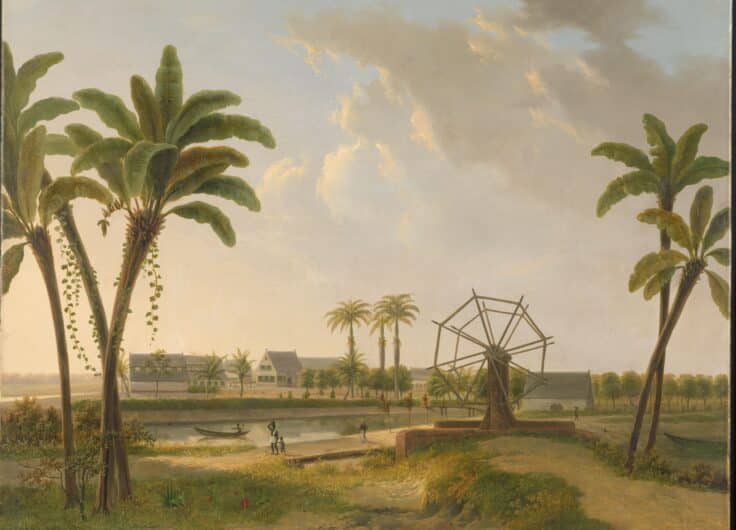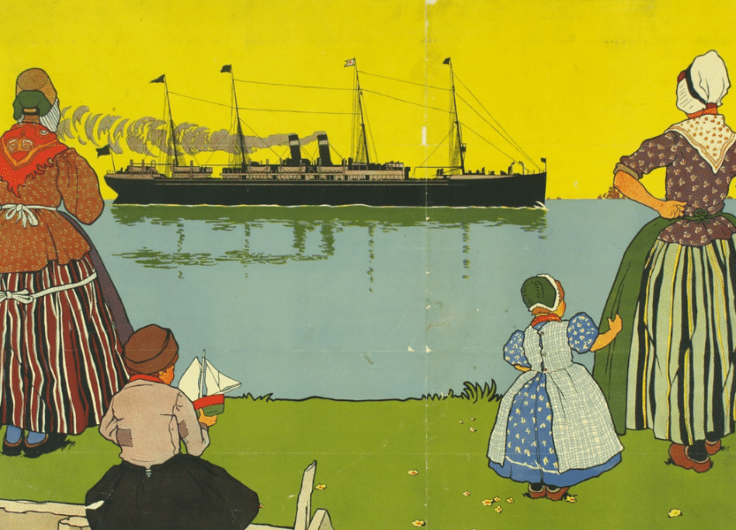‘Weerlicht’ by Jante Wortel: Wrestling With Obsessive Compulsions
In her debut novel, Jante Wortel paints a stark portrait of a teenager whose family is held in the grip of her OCD.
To be honest, after having read several dozen pages in Weerlicht (Lightning), I felt incredibly irritated by Lea, the 15-year-old who describes her family camping trip with her parents and her older brother Fos through Norway, her mother’s lifetime wish. But just as I was deciding whether or not to file this story – of what I thought was a typically nagging and self-involved teenager – on the pile of rejected debut novels, something in the story happened that piqued my curiosity about how it would end.
 Jante Wortel
Jante Wortel© Willemieke Kars
And at the same time, I realised that crafting such an irksome character, one who gets under the reader’s skin, is pretty impressive. In films, we often sympathise with antiheroes or characters who are far from perfect. And so my initial dislike for Lea transformed into understanding her, and eventually even liking her.
That is completely to the credit of debuting author Jante Wortel (b. 1996). In 2016, the then 20-year-old won the Groningen edition of the contest Write Now!, after which she studied Creative Writing at ArtEZ in Arnhem. According to the short bio in her book, as a child, she wanted to become a clown, but she was told she was too shy to join the youth circus. So she began to write. That shyness is a trait Wortel has in common with her main character Lea, whom teachers describe to her parents as hardly ever speaking. And if she does, she whispers.
This contrasts with the aggressive way the 15-year-old sometimes snaps at her parents and her brother Fos. Although that is typical teenage behaviour of course. In the presence of other adults, she is subdued, but inside the confines of her family, the devil is unleashed. On top of being a teenager, Lea has an eating disorder and obsessive compulsions, in which time management plays a big role.
Much more than a story of a camping trip, that despite several dramatic elements and unexpected turns is still fairly anecdotal, family interactions are at the core of Weerlicht. Because while Lea herself is the one most affected by her eating disorder and neuroses her entire family must adapt too.
Her brother Fos is often annoyed by his sister and sometimes seeks out conflict, while their parents seek the best way to help their daughter. But how? By loosening their grip and giving her more freedom, which might mean she dramatically loses more weight? Or should they look for connection, through talking, hugs and intimacy?
Striking the right balance is a difficult journey, which no one knows how to achieve. Lea sometimes wants affection, but at the same time, she feels controlled by her parents. She thinks they are encouraged by the counsellors who are dealing with her case.
And ultimately that is what it is about: control. Control over your own body, your own life, your own decisions. One moment Lea feels suffocated and longs for freedom, while the next she seeks compassion and security, support and understanding for her decisions and her way of life. All this manifests in the obsessive-compulsive disorder that starts to completely dominate her life, and that of her family members.
Father tries to understand her by reading books. Lea doesn’t like that: ‘he’s never asked me anything.’ Still, she starts to understand her father’s worries a bit more after she makes an important discovery. And she also learns things about her mother that place her in a new light. But whether that makes living together any easier remains to be seen.

A light storm is the silent signal of doom on the horizon. It is not hard to see the symbolism in that. And so there are several other slightly too obvious hints, which stylistically speaking bear the marks of a course in creative writing.
But don’t let that put you off. Wortel’s book contains a strong and vibrant character in Lea, and an even more striking portrayal of a family trying so hard to stick together that it becomes dysfunctional at times.
Excerpt of ‘Weerlicht’, as translated by Elisabeth Salverda
I stand watching the birds. The hail-white seagulls are flying along with the boat, as though by chance they are going the same way as us. Now and then one stays motionless in the air, wings spread, balancing on a drift of wind. Fos takes pictures.
‘Lee, smile,’ he says.
‘Stop it,’ I answer.
I tighten my grip on the railing, and turn my head the other way. When he keeps at it anyway, I pretend not to hear him and focus on the sky. It is mid-August, but though the sun is shining and the sky is bright blue, it feels like it could be February. The hairs on my arms are still raised, even under all my layers of clothing.
We shouldn’t expect too much from the Norwegian summer, my mother said a few days ago. The weather in Norway is similar to the weather in the Netherlands, whether you can really speak of a summer just depends on – yes, on what actually. Sometimes it rains, sometimes the sun comes out, you can’t plan for that. The night before we left, she asked me how many jumpers I’d packed and then added two extra fleeces. ‘You can even put them on over each other,’ she suggested, ‘in case you really need to.’ I nodded, though I wondered if it was my perseverance she was worried about or that of the weather.
Casper had given me a map with three mountains on it, the last time he came to our house. Good luck, Lea, he wrote. I have complete confidence in you, and just remember: when the going gets tough, think about the helicopter. I liked the colours on the card most. Each mountain was a different pastel shade, yet they blended together, and the overall picture reminded me of the photo I’d seen when I had googled ‘Norway.’ ‘Maybe you could take that card with you,’ my mother said, ‘as a reminder,’ but I pinned it to my corkboard. It was fine there, I thought. I don’t need reminders. After all, my father is coming too and if there is anyone who constantly reminds me of our agreements, he does. With two breaches I lose part of my newfound freedom. More than two, and we go home, I can no longer choose. Then I have to listen to my parents.
Every time he says that I am reminded of the words my mother once had printed on a tile as a joke, but also quite serious. That tile still hangs in the toilet at our house and I’ve considered quoting it a few times. But I don’t because that would be too risky. Nothing except breathing is necessary, it says on the tile. If I’m honest, that will be more useful to me in the next few weeks than the biggest lie I’ve ever heard, written on a postcard. I have complete confidence in you.
‘Can’t you smile just a little?’ asks Fos.
‘Fós, stop,’ I say. ‘I mean it.’
I move away from the railing, far enough until I’m sure I’m out of range of his camera. My mother is sitting on a red rectangular box next to my father. Her oxygen tube hangs a little askew under her nose.
‘How long?’ I ask, looking impatiently at my watch. ‘I thought we would arrive ten minutes ago. That sign in the hall said we would.’
My mother looks up. ‘Well,’ she says. ‘It won’t be long then, my love.’
Then straight away she focuses again on the map my father is holding, the first campsite is a forty-minute drive from the port.
I sigh.
We could see Oslo, the point of arrival, for almost half an hour already, but we didn’t seem to be getting any closer. We weren’t even allowed to take our stuff to the deck where all the cars were parked, even though according to the schedule that should have been allowed ages before.
Camera around his neck, Fos comes to stand next to me. His hair is flapping wildly in the wind. When he sees how annoyed I look, he shrugs.
‘What?’ he asks.
I don’t reply.
A few minutes later, the deck finally begins to empty out. When it is a bit quieter in the stairwell, we also head to the caravan, and I can hardly wait to get back to my things. My phone and the charger I forgot to grab when we got out. According to the red bar on the screen, it is about to die. And the car’s clock has been behind for years. I’m most worried about the arrival time at the campsite, but as long as we get off the boat, that makes a difference too. If we’re allowed to drive. If the car charger works.
‘Lea,’ my father says when I ask for the third time why we can’t start the engine yet, ‘stop nagging, please. I don’t know either, so please be patient.’ He looks at me through the rear-view mirror. My mother turns in her chair and wants to put her hand on my knee, but I draw it away.
‘We’ll make it before six,’ she says, ‘promise.’
I cross my arms, and even though I know it’s childish, I start to wiggle my foot impatiently. Fos looks at me questioningly for a few seconds, then rolls his eyes and leans his head against the window.
By the time we finally see the ramp go down, the deck is starting to sound like a Formula 1 track just before the starting gun and my dad hasn’t said yet, see?, it almost doesn’t feel like a relief anymore, more like something I’m entitled to, and at the same time like a false start to a holiday that has three weeks to go.
Jante Wortel, Weerlicht, Das Mag, Amsterdam, 2022, 256 pp.












